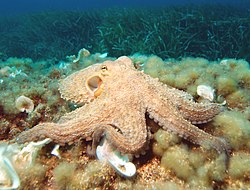polvo
Jump to navigation
Jump to search
Esperanto[edit]
Etymology[edit]
Borrowed from Italian polve, from Latin pulvis (“dust, powder”). Compare German Pulver (“powder”), French poudre (“powder”), English powder.
Pronunciation[edit]
Noun[edit]
polvo (accusative singular polvon, plural polvoj, accusative plural polvojn)
Derived terms[edit]
Ido[edit]
Etymology[edit]
Borrowed from Esperanto polvo, Italian polvere, Spanish polvo.
Pronunciation[edit]
Noun[edit]
polvo (plural polvi)
Derived terms[edit]
- polvoza (“dusty”)
- senpolvigar (“to dust”)
Portuguese[edit]

Etymology[edit]
From Old Galician-Portuguese polbo, from Latin polypus (“octopus”), from Ancient Greek πολύπους (polúpous). Doublet of pólipo.
Cognate with Galician polbo, Spanish pulpo, Italian polpo, French poulpe, pieuvre.
Pronunciation[edit]
- Hyphenation: pol‧vo
Noun[edit]
polvo m (plural polvos, metaphonic)
Related terms[edit]
Spanish[edit]
Etymology[edit]
Inherited from Old Spanish polvos (singular),[1] from Vulgar Latin *pulvus, neuter form derived from Classical Latin pulvis m, from Proto-Indo-European *pel- (“flour, dust”).
Pronunciation[edit]
Noun[edit]
polvo m (plural polvos)
- dust (fine, dry particles of matter found in the air and covering the surface of objects)
- powder, dust (fine particles of a dry substance)
- (vulgar, colloquial) fuck, screw (sexual intercourse)
- 1994, José Ángel Mañas, chapter XIV, in Historias del Kronen, Barcelona: Ediciones Destino, →ISBN, page 220:
- ¿Dónde están Pedro y su cerda? ( ) Han salido al jardín, seguro. ( ) Ven, Roberto, que vamos a ver un polvo en primer plano.
- (please add an English translation of this quotation)
- (plural only) see polvos
Derived terms[edit]
Related terms[edit]
References[edit]
- ^ Joan Coromines, José A. Pascual (1985) “polvo”, in Diccionario crítico etimológico castellano e hispánico (in Spanish), volumes IV (Me–Re), Madrid: Gredos, →ISBN, page 599
Further reading[edit]
- “polvo”, in Diccionario de la lengua española, Vigésima tercera edición, Real Academia Española, 2014
Categories:
- Esperanto terms borrowed from Italian
- Esperanto terms derived from Italian
- Esperanto terms derived from Latin
- Esperanto terms with IPA pronunciation
- Esperanto terms with audio links
- Rhymes:Esperanto/olvo
- Esperanto lemmas
- Esperanto nouns
- Ido terms borrowed from Esperanto
- Ido terms derived from Esperanto
- Ido terms borrowed from Italian
- Ido terms derived from Italian
- Ido terms borrowed from Spanish
- Ido terms derived from Spanish
- Ido terms with IPA pronunciation
- Ido lemmas
- Ido nouns
- Portuguese terms inherited from Old Galician-Portuguese
- Portuguese terms derived from Old Galician-Portuguese
- Portuguese terms inherited from Latin
- Portuguese terms derived from Latin
- Portuguese terms derived from Ancient Greek
- Portuguese doublets
- Portuguese 2-syllable words
- Portuguese terms with IPA pronunciation
- Portuguese lemmas
- Portuguese nouns
- Portuguese countable nouns
- Portuguese nouns with metaphony
- Portuguese masculine nouns
- Spanish terms inherited from Old Spanish
- Spanish terms derived from Old Spanish
- Spanish terms inherited from Vulgar Latin
- Spanish terms derived from Vulgar Latin
- Spanish terms inherited from Latin
- Spanish terms derived from Latin
- Spanish terms derived from Proto-Indo-European
- Spanish 2-syllable words
- Spanish terms with IPA pronunciation
- Spanish terms with audio links
- Rhymes:Spanish/olbo
- Rhymes:Spanish/olbo/2 syllables
- Spanish lemmas
- Spanish nouns
- Spanish countable nouns
- Spanish masculine nouns
- Spanish vulgarities
- Spanish colloquialisms
- Spanish terms with quotations
- Spanish pluralia tantum
